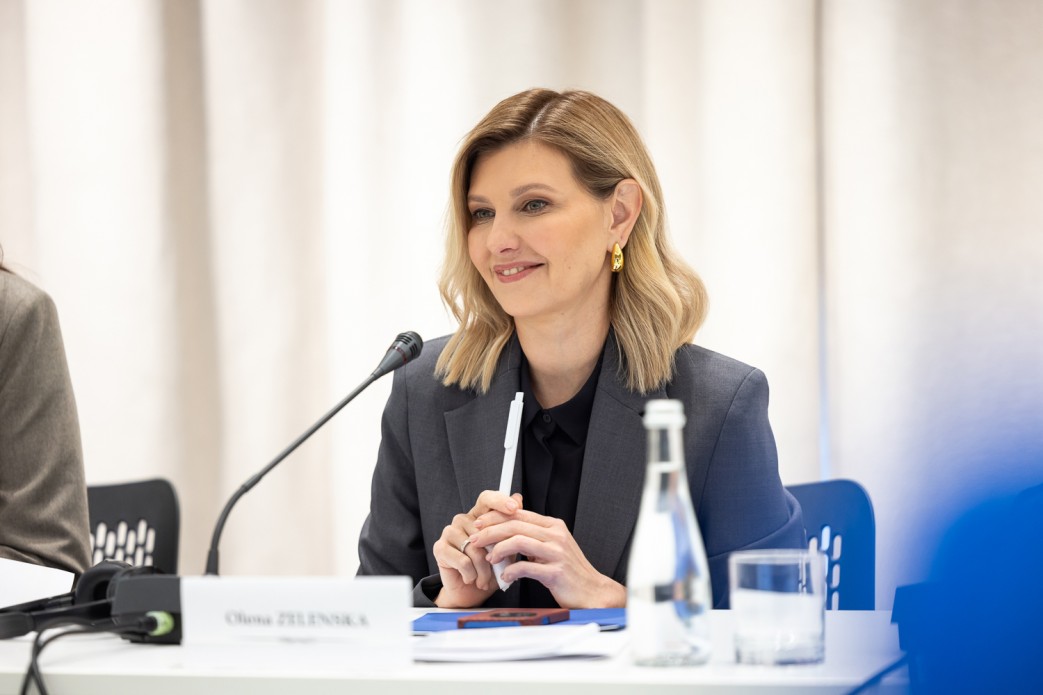First Lady of Ukraine Olena Zelenska participated in the event "On the Path to Implementing the National Strategy to Address the Gender Pay Gap by 2030 and the Contribution of Partners to this Process," which took place under the leadership of Minister of Economy Yulia Svyrydenko.
 "Recently, the Nobel Prize in Economics was awarded to American scientist Claudia Goldin for her in-depth exploration of women's positions in the labor market. In essence, she wrote an entire economic detective story to understand what hinders women from working and earning a fair income. Specifically, she identified that although female wages increased throughout the 20th century, this growth slowed in the 2000s, and today, women's earnings in the United States and the EU are approximately 80% of men's," the First Lady said.
"Recently, the Nobel Prize in Economics was awarded to American scientist Claudia Goldin for her in-depth exploration of women's positions in the labor market. In essence, she wrote an entire economic detective story to understand what hinders women from working and earning a fair income. Specifically, she identified that although female wages increased throughout the 20th century, this growth slowed in the 2000s, and today, women's earnings in the United States and the EU are approximately 80% of men's," the First Lady said.
Olena Zelenska reminded that in September, as part of the UN General Assembly's "International Equal Pay Day 2023" event, there was a global discussion on overcoming this gap.
 "Like most developed countries in the world, Ukraine has committed to overcoming the gender pay gap in the next seven years. The Russian aggression has put this significant effort at risk, just like all aspects of our lives and even our very existence. When I spoke in New York in September as part of the event 'International Equal Pay Day 2023,' I emphasized that during wartime, development usually suffers first because people are focused on survival. However, both then, at the UN General Assembly, and now, I am pleased and it is important for me to note: this is not the case for us. Ukraine has made a fundamental decision – to develop despite the war. The state does not deviate from this path, even though it is sometimes mined, and sometimes we have to advance under fire," the First Lady said.
"Like most developed countries in the world, Ukraine has committed to overcoming the gender pay gap in the next seven years. The Russian aggression has put this significant effort at risk, just like all aspects of our lives and even our very existence. When I spoke in New York in September as part of the event 'International Equal Pay Day 2023,' I emphasized that during wartime, development usually suffers first because people are focused on survival. However, both then, at the UN General Assembly, and now, I am pleased and it is important for me to note: this is not the case for us. Ukraine has made a fundamental decision – to develop despite the war. The state does not deviate from this path, even though it is sometimes mined, and sometimes we have to advance under fire," the First Lady said.
She emphasized the importance of the National Strategy for Reducing the Gender Pay Gap, which the government approved on September 15, 2023. The implementation of the initial points of this document has already begun. Government officials have plans to reduce the gender pay gap from 18.6% to 13.6% by 2030.
 The implementation of the strategy is aimed at achieving three main objectives:
The implementation of the strategy is aimed at achieving three main objectives:
1. Improve legislation on equal pay, specifically by making changes to it and updating the methodology.
2. Create favorable conditions to overcome stereotypes and discrimination based on gender in professions: increase the number of employers implementing gender equality principles in the workplace, support gender audits, and promote the adoption of gender equality and non-discrimination by employers.
3. Create favorable conditions for the convenient combination of family and professional responsibilities.
"Our strategy has a measurable goal: by 2030, we aim to reduce the gender pay gap by an additional 5 percentage points, from 18.6% to 13.6%. After our victory, Ukraine should become a country without barriers and prejudices. We need to build it as an innovative, people-centered, and open-to-diversity nation. The national strategy for overcoming the gender pay gap is just one of the tools to transition of our society to new standards. Equality of opportunities is the guarantee of the harmonious development of the state and society," Yulia Svyrydenko said.
According to her, the Ministry of Economy started implementing this strategy in May. The first results have been achieved:
- The Ministry of Economy has prepared a draft Labor Code.
- UN Women announced a tender for a communication campaign for the strategy.
- Inspections by the State Service of Ukraine for Labor have been reinstated.
- The government has taken into account the OECD Council's recommendation on ensuring gender equality in education, employment, and entrepreneurship.
- The Ministry of Economy is implementing the eWork grant program, which promotes the involvement of women, including veterans' wives, in entrepreneurship.
 A large-scale information campaign called "Of Course, You Can" has also been initiated to overcome stereotypes and strengthen the role of women in post-war reconstruction.
A large-scale information campaign called "Of Course, You Can" has also been initiated to overcome stereotypes and strengthen the role of women in post-war reconstruction.
Planned information campaigns (by the Ministry of Education and regional and Kyiv city administrations) are aimed at:
- Parents, teachers, and educators to prevent the spread of gender stereotypes among young people regarding their choice of educational paths and professions.
- Girls and women to encourage the choice of educational paths and professions in which women are traditionally underrepresented.
- Boys and men to encourage the choice of educational paths and professions in which men are traditionally underrepresented.
"As Nobel laureate Mrs. Goldin emphasizes, reducing the gender pay gap is not only dependent on formal requirements for equal pay. It depends on systemic restructuring of workplaces and the implementation of flexible working conditions for all employees, including women. Working conditions that take into account factors such as motherhood and the tremendous efforts women invest in it. Removing barriers for women will enhance their competitiveness in the labor market. Then, it simply won't make sense for companies to discriminate against them. Therefore, reducing the gender pay gap starts with fair treatment regardless of gender. Recognizing their own value by women themselves and removing barriers to their growth will require significant efforts from both the government and employers. I am confident that together we can walk this path with dignity, even during times of war, especially during times of war, because both men and women are fighting for our dignity," Olena Zelenska concluded.




